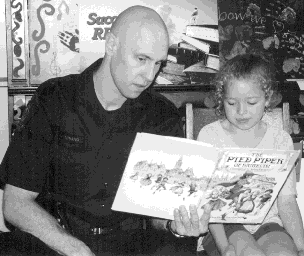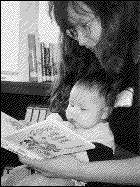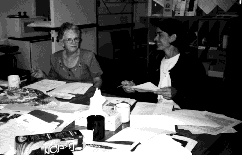

Welcome An exciting new project is underway at Prospects Literacy
Association in Edmonton, Alberta. We are in the process of
setting up a provincial Centre for Family Literacy, the
first of its kind in Canada! The Centre will run many of the
programs currently run by Prospects; other components of the
centre will include promotion and research, as well as
provision of information, training, and resources. This site is intended to update you on the progress of
the Centre as it develops, and to provide background
information and other details about the
project. For information about
programs in family literacy currently offered, visit the
Prospects web
site. The Literacy Needs of Alberta Families From September 1996 to September 1997, individuals and
organizations, including Prospects Literacy Association,
Success by 6® , United Way, the University of Alberta
and family literacy professionals met to discuss means of
better supporting the development of literacy in families.
Participants in these discussions perceived the most
effective and efficient way to address the gaps in service
was the establishment of a Centre for Family Literacy in
Edmonton. Further discussions determined that such a Centre
should support and expand upon the work of family literacy
practitioners across the province. To this end, a grant has
been received from the National Literacy Secretariat to
develop this Centre over a two year period. Family Literacy at Prospects Literacy
Association Prospects has the administrative expertise, the family
literacy program experience, and the strong interagency
liaisons in place to spearhead and direct the development of
a Family Literacy Centre. Family Literacy in Edmonton
(FLIE), under the direction of Prospects, is the most
comprehensive family literacy project in the province.
Constructed within a cross-agency collaborative framework
that includes the University of Alberta, Northern Alberta
Reading Specialists' Council, the Capital Health Authority,
the Office of Commissioner of Services for Children and
Families, United Way, Success by 6®, local Foundations,
Headstart programs, daycares, Community Service Centres and
schools, Prospects has served almost 4,000 families in the
last three years. Programs range widely in addressing the
literacy needs of parents and their children from birth to
elementary school age (visit the Programs
page at the Prospects web site). The Services of a Centre for Family Literacy A provincial centre for family literacy will help meet
the increased demand for information, training, resources,
liaison, programs and program accountability. The Centre
will: • serve as a resource and information centre for
family literacy programs throughout Alberta;
Staff (*denotes part time) Current Board
Members: Mr. Randy Boissonnault, Mr. Ian Cochrane, Ms. Cathy Krysa, Mr. Del Lewis, Dr. Stephen Norris, Ms. Liz O'Neill, Ms. Christine Palichuk, Mr. Derrick Pieters, Mr. Jason Randhawa, Mr. Roger Simpson, Dr. Elizabeth Vetsch, Cst. Mike Woodman, Executive Committee Executive Committee Purpose Membership Authority Length of Membership Frequency of Meetings Function
1. Provide a transition between the work of F.L.A.G. and
the development of the Centre in terms of responding to
requests for information, dissemination of resources and
providing an interim response to the general need for
support of family literacy work. Begin to make known the
plans for development of the Centre. 2. Conduct a thorough needs assessment to help determine
the kinds of services, resources (materials and expertise)
and facilities required to help support existing and
fledgling family literacy programs and groups; also to
verify the extent to which the Centre could be used as a
research facility. 3. Develop a conceptual framework for the Family Literacy
Centre including mission, vision, and values. This process
will also determine the scope of facilities, services,
resources, personnel, and organizational structure to meet
the needs identified in #2. 4. Establish an interim organizational structure for the
Centre, including steering, advisory and standing committees
for the project, and develop terms of reference and roles
and responsibilities for them. Liaise between and support
these committees in their development work. Plan for
transition to new organizational structure. 5. Conduct a cost analysis for facilities, resources,
personnel, materials, programs and develop a plan for year 2
based on the results. 6. Develop a consultation process for receiving input
about the Centre from all stakeholders including various
provincial and federal government departments, LCA,
F.L.A.G., AAAL, literacy programs in Alberta, health and
social service agencies, aboriginal and multicultural
groups, and literacy organizations in other provinces. . 7. Obtain initial commitment from potential funders or
major partners and collaborating agencies.
a) Planning b) Organizational Structure c) Promotion and Communication d) Support to Programs e) Facilities and Resources f) Commence Operations g) Evaluation and Accountability h) Capital Fundraising Campaign Resources that were formerly distributed by F.L.A.G.
(Family Literacy
Action Group) are now available from Prospects Literacy
Association and will soon be available from the Centre for
Family Literacy. Currently, you can order these items by
contacting Prospects,
or by emailing the CFL project office at the email address
below. If prepaying, please make cheques payable to
Prospects Literacy Association. Note: this resource is also available online
at the NALD website at: Note: All three F.L.A.G. publications, plus a
binder, are available for $49 plus $10 shipping. Please
make cheques payable to Prospects Literacy
Association.
One of the first tasks of the project was to develop a
core promotional package which will be used to approach
supporters and funders for the project. The centrepiece for the package is a 14 page brochure
containing relevant information about literacy, family
literacy, and the Centre for Family Literacy project. We have also included in the package, information sheets
about the family literacy programs at Prospects as well as
statistical information, about numbers of participants over
the past several years. Another piece in the package is a summary of an
interesting study in family literacy carried out in the
United Kingdom. This study "Family Literacy Works" and a
follow-up report " Family Literacy Lasts" provide excellent
evidence of the value of one type of family literacy
program. Finally, the package contains a compilation of needs
assessment surveys which we used to clarify the need for
family literacy programs in Alberta and across Canada.

• host a variety of adult and family literacy programs
to meet the needs of "at risk" families within the capital
area;
• maintain a holistic approach towards the
literacy/learning needs of the adults and children it
serves;
• act as a catalyst for interagency support for "at
risk" families;
• serve as a provincial training centre for family
literacy workers, educators and other professionals in
related areas;
• serve as the location for intensive and long term
research on the effectiveness of family literacy programs as
educational intervention;
• be a centre for innovation in which new ideas about
learning and education can be piloted and implemented;
and
• serve as a model for the development of future family
literacy centres across Canada.
Xennex Business Networks
General Manager, Bargain Finder Press
Project Coordinator, Alberta Health and
Wellness
Henning, Byrne, Whitmore & McKall Law
Office
Dept. of Education Policy Studies, U of A
Exec. Dir., Big Sisters & Big Brothers Soc.
of Edmonton
General Manager, CIBC
Regional Manager, Public Affairs, Capital Health
Authority
WavePOINT Systems Inc.
Office of the Auditor General of Canada
Grandview Heights Medical Clinic
Edmonton Police Service

Terms of Reference
The Executive Committee has the same general purpose
as the Steering Committee to guide the development of the
two-year project. The Executive Committee will have somewhat
more responsibilities as described under Function.
Two Prospects staff and 3-5 members with a committed
interest in the establishment of the Centre. The
Administrative Assistant will attend as a non-voting member
to take Minutes.
Works within the Steering Committee with the same
authority as the Steering Committee.
From September 1997 to September 2000
At least once a month.
The Executive Committee will ensure that the project
moves forward by performing certain functions on behalf of
the Steering Committee. These include:
Created by FLAG for workers in family literacy, this
manual provides:
Topics include:
Topics include:

For more information about the Centre for Family Literacy Project, contact the project coordinator at the address below, or contact Prospects Literacy Association.
Centre for Family Literacy
Project
9913-108 Ave, EDMONTON, Alberta,
T5H
1A5 CANADA
Phone: 780-424-1660 Fax:
780-424-1676
cflp@aaal.ab.ca
|
©1998-2000, OM Corporation |
|